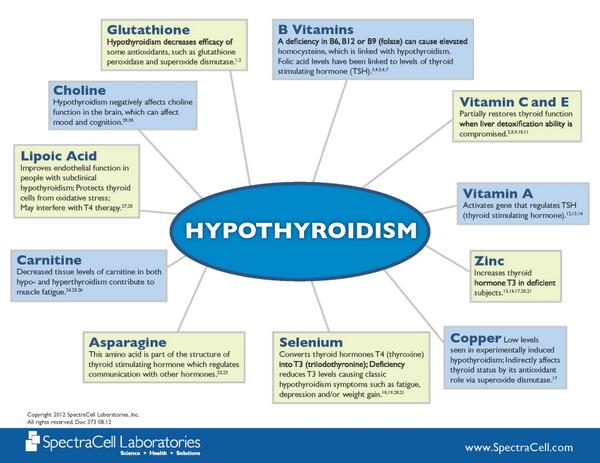The thyroid gland is situated in front of the neck, just below your larynx (voice box).
Did you know?
The hormones produced in your thyroid gland regulate metabolism in every cell of the body. Therefore, a deficency of thyroid hormones can affect virtually all body functions. People with low thyroid function are diagnosed with Hypothyroidism and if the deficiency is severe it can be life-threatening (Myxedema).
SIGNS AND SYMPTOMS:
Depression
|
Difficulty Losing Weight
|
Dry Skin
|
Headaches
|
Hyperlipidemia
|
Headaches
|
Recurrent Infections
|
Cold Intolerance
|
Thinning of Eyebrows
|
Lethargy/Fatigue
|
Memory Problems
|
Menstrual Problems
|
Are you getting the Nutrients you need?
There is overwhelming evidence that micronutrient deficiencies are associated with the chronic disease process and the overall condition of one's health. Around the globe the most common cause of hypothyroidism is iodine deficiency. Iodine deficiency leads to hypothyroidism or the development of an enlarged thyroid gland (a goiter), or both. Zinc, selenium, vitamin E, and vitamin A function together in many body processes, including the manufacture of thyroid hormone. A deficiency of any of these nutrients would result in production of lower levels of active thyroid hormone.
HYPOTHYROIDISM: Nutrient Correlation Wheel

FACT: It is estimated that 12% of people will have a thyroid problem in their lifetime.
Below are tips on three supplements that could help or harm your thyroid.
- Iodine, vitamin D and selenium can all impact thyroid health through affecting the immune system and potentially increasing or reducing chances of autoimmunity.
- The most common cause of hypothyroidism in westernized countries is an autoimmune process known as Hashimoto’s Thyroiditis.
- Hypothyroidism is diagnosed when TSH is high and T4 is low.
- Some studies show that you can lower the antibodies associated with Hashimoto’s with selenium. However, these studies may be biased.
- Recommended dosage of selenium is 200mcg per day.
- There is much association data showing that patients with Hashimoto’s or hypothyroidism have low vitamin D levels. Recently, a study showed treatment with Vitamin D decreased TPO antibodies.
- Recommended vitamin D levels between 40-50 ng/mL.
- Replete vitamin D deficiency with a dose between 2,000IU-10,000IU per day.
- Best source of vitamin D is good, safe sun exposure.
- 24-hour urinary iodine is the gold standard for iodine testing.
- The research shows the best-established environmental factor contributing to thyroid autoimmunity is excess iodine.
- A low iodine diet has been shown to help thyroid autoimmunity. A low iodine diet is defined as less than 100mcg of iodine per day but one should always be above 20mcg per day to avoid iodine deficiency.
- Recommended daily iodine intake should be between 150mcg-1100mcg per day with a sweet spot around 450mcg.
- LEARN MORE TODAY ON TREATING MICRONUTRIENT DEFICENCY RELATED CONDITIONS
- CONTACT DR. EZZY at 832-913-5022
- RoyalHealingND.com

No comments:
Post a Comment